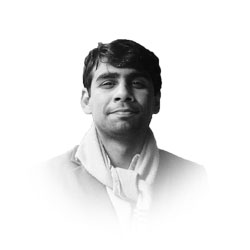By: Wali Ejaz Nekokara
Anti-Shia protests by the extremist groups like sipah-Sahaba and Tehreek Labaik Pakistan rattled Karachi. The slogans against the Shia community were being chanted and the protestors demanded the ban on Muharram processions. Protestors accused major Shia leaders of blasphemy due to their alleged derogatory remarks against prominent Islamic figures. The protests in Karachi have exposed the potential to challenge national security. Different religious views and the political and economic interests are triggering the menace of sectarianism. Sectarianism has a history in this country. In 1953, anti-Ahmadiya riots paved way for the imposition of Martial law that was confined to Lahore. In Ayub Khan’s era, there were sectarian clashes and one of them was an attack on Muharram procession in a town near Khairpur Sindh. The 1980s gave an impetus to sectarianism. Zia introduced Islamic laws and he also criminalized the disrespect of the Quran and the derogatory remarks against Prophet S.A.W by inducing Clauses 295-B and 295-C into the Pakistan Penal code. Blasphemy laws were less used for actual purpose but more as a weapon by the foulmouthed Mullahs against people having different religious interpretations. Available data portrays a very grim picture of the use of blasphemy laws. Prior to 1986, there were merely 14 cases of blasphemy and according to National Commission for Justice and Peace, “1,335 Pakistani have been accused of blasphemy between periods of 1987 to 2014. In these 1,335 Pakistanis, 663 Muslims, 187 Christians, 494 Ahmadis, and 21 Hindus were included.
After Zia introduced Islamized laws, the Shia community felt the need to show their strength and to demand their rights. Organized Shia people marched toward the capital and they demanded that every Islamic school of thought should have the freedom to govern itself by its own interpretation of Islam. Unity and mobilization of Shias smoothed the way for the establishment of a movement namely “Tahrik- I- Nifaz- I- Fiaqh Jaffariya”. After the Iranian revolution, the unity among Shias added to Sunni’s dismay and Sipah-e-Sahaba was established in 1985. Sipah-e-Sahaba emerged as an arch-enemy of the Shia community. The murder of Maulana Haq Nawaz Jhangvi (leader of Siph e Sahaba) in 1990 accelerated anti-Shia attacks. In 1995, the Mili-Yak-Jehti Council came to the fore to bring about unity among religious parties but it could not succeed in restoring normalcy. A group of radical sectarian extremists separated from Siph-e-Sahaba and established a new sectarian group “Lashkar-e- Jhangvi” in 1996. It was also Anti-Shia. Both the groups (Shia-Sunni) targeted each others’ leadership. According to the South Asian Terrorism Portal, “From 67 incidents of sectarian violence with 18 killings in 1989 to 3072 incidents with 5602 killings till June 2018 were recorded”.
Palpably, the Shia sect faces endless persecutions and Sunni extremists are shrinking the room for Shias. Especially the people of Hazara in Quetta are the most vulnerable community in Pakistan. According to the Human Rights Commission of Pakistan, “700 Shias were killed and more than 1000 were injured in more than 200 attacks in 2013”. Over 90pc of these attacks were reported in Quetta, Karachi, Parachinar, Islamabad, and Rawalpindi. According to news, “4847 Shia people lost their lives between 2001 to 2018”. Furthermore, Global Extremism Monitor revealed that 95pc of sectarian violence worldwide focused on the Shia community. Pakistan was listed among the countries most affected due to sectarian violence. The study maintained that “over 1,489 people were killed in Pakistan in 2017 on the name of religion including 247 civilians”. Another thing that was mentioned by the study was that terrorists in Pakistan work on two agendas; first is to undermine the Pakistani state and Second to target the Shia community.
Sectarianism has dangerous implications for peace and stability in the country. A research article published by “Journal of Political Sciences & Public” titled “History of sectarianism in Pakistan: Implications for lasting peace”, provides us with a succinct view of the implications of sectarianism. In this article, the implications are categorized into three parts social implications, political implications, and economic implications. In social implications, constant fear in people, loss of life, defamation of Islam, and loss of freedom are included. In economic implications, poverty, shrinking foreign investment, migration, and infrastructural loss are included. Last but not least are political implications, in which distrust towards government, weakening national unity, ruining Pakistan’s soft image are included. Noam Chomsky in his book “Failed state” writes some of the characteristics of failed states in which one of the most important characteristics is the state’s failure to protect its citizens against the violence. Pakistan has embraced this trait for a long and it is going to clinch the title of a failed state.
A question arises, what is the way out? First of all, political leadership has to be active and madrassas which are preparing the minds of students according to a particular sect that must be closed. Madrassas should be under the governments’ control and the course outlines must be prepared by religious scholars. There should be a head of the madrassa designated by the government and the head must be a religious scholar with a deep understanding of Islam and modern education. The courses of science, mathematics, English, and comparative religion must be incorporated in the syllabus. Secondly, strict action against those who make derogatory remarks against each others’ beliefs. We have to break the dominance of Mullah and have to eliminate the molvi institution. It can be done by encouraging people to understand the Quran on their own and people should be able to offer the Namaz e Janaza of their family members. Thirdly, there must be a probe into the religious extremist parties’ nexus with foreign countries whether they are taking money for promoting hate or not. Those religious parties with their links with foreign countries like India must be banned. Fourthly, our state has to abandon the support of extremist religious parties owing to their potential to tarnish peace and national security. Fifthly, the most important point is to ensure good governance, rule of law, and justice because the absence of these is cementing the clout of religious extremists and encouraging them to roam freely with impunity. I would like to clarify one thing that everything is possible with the willingness of civil-military leadership. If the creation of a mess is possible then its eradication is possible too. Any ostrich-like approach will further add to the instability and national insecurity. Pakistan needs sagacious leadership instead of a rapacious one.
The writer is a freelance writer graduated from School of Politics and International relations Quaid I Azam University Islamabad. He can be reached at [email protected]
The opinions expressed in this publication are those of the authors. They do not purport to reflect the opinions or views of the ‘The Dayspring’






